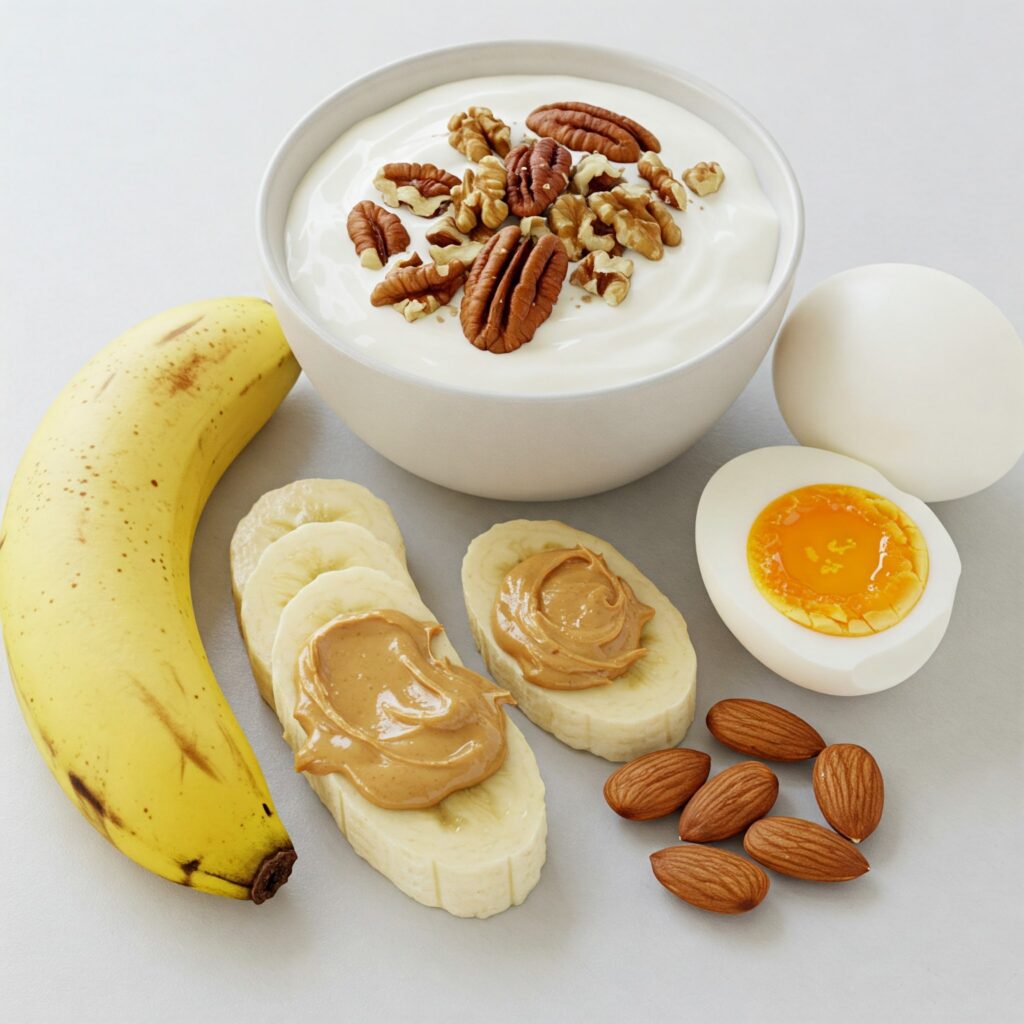
You’ve undoubtedly heard it before: eating late at night makes you gain weight. Perhaps you’ve even felt terrible about eating a snack before bed, believing it’s ruining your diet.
But is this really true? Is it just another dietary myth handed down over the years?
The notion that late-night eating always leads to weight gain has existed for a long time, but the reality is a little more complex. Your body does not suddenly decide to accumulate more fat because you ate after a specific time. Other factors come into play, including as what you eat, how much, and how well you sleep.
Here we’ll break down the science behind late-night eating and weight gain. You’ll learn how your body processes food at different times of the day, what research actually says about nighttime snacking, and whether you really need to worry about that midnight bowl of cereal.
1. Understanding the Body's Circadian Rhythm
Have you ever wondered why you feel more enthusiastic in the morning yet lethargic late at night? That is your circadian rhythm at work! Think of it as your body’s internal clock, managing everything from your sleep cycle to digestion.
It helps to control when you feel hungry, how your body processes food, and even how effectively you burn calories.

Here’s the thing: your metabolism changes throughout the day. According to research, your body processes meals better earlier in the day due to increased insulin sensitivity (how effectively your body manages sugar).
At night, your metabolism slows, making it more difficult for your body to burn energy efficiently.
Some studies show that eating late at night may induce weight gain not because of the timing itself, but because of how it affects your hormones and metabolism. (Click Here)
Another important factor? Sleep. Sleep disturbance is frequently associated with late-night eating, and sleep deprivation can alter hunger hormones, increasing your desire for high-calorie foods the following day.
Have you ever noticed how you tend to seek for more food when you’re sleep deprived? Your body is attempting to compensate for the energy you have lost.
Now that we’ve covered how your internal clock affects your metabolism, let’s take a closer look at what the research actually says about eating late at night and weight gain!
2. Understanding Research on Late-Night Eating and Weight Gain
Is it true that eating late at night causes weight gain? In a nutshell, it depends. There isn’t a magical moment when your body chooses to turn every meal into fat. However, there is evidence that eating habits can affect both your weight and general health.
What the Science Says
Regular late-night eaters typically weigh more than individuals who eat earlier in the day, according to studies. But here’s the catch it’s not just about the time you eat; it’s about what and how much you’re eating.

One study from Harvard University found that late eaters not only consumed more calories overall, but they also had higher levels of hunger hormones and lower energy expenditure (which means they burned fewer calories at rest) compared to early eaters (Know More)
The Real Culprit: Mindless Eating
Late night eating often means snacking on things like chips, cookies, or ice cream while watching TV. It’s easy to overeat when you’re distracted, and those extra calories add up over time. Late-night cravings are also linked to stress, boredom, and lack of sleep, which can lead to emotional eating.
So, Should You Stop Eating at Night?
Not necessarily! If you’re truly hungry, a small, balanced snack (like Greek yogurt, nuts, or a banana with peanut butter) won’t derail your progress. The key is being mindful of your hunger cues and not just eating out of habit or boredom.
3. Factors Influencing Weight Gain Beyond Meal Timing
We know that eating late at night can play a role in weight gain, but it’s not the whole story. The truth is, when you eat is just one piece of the puzzle your overall lifestyle, food choices, and daily habits matter way more.

1. Total Calorie Intake Matters More Than Timing
At the end of the day, weight gain happens when you consistently eat more calories than your body burns. Whether you eat those extra calories at 8 AM or 10 PM, your body is going to store the excess as fat.
A study published in the American Journal of Clinical Nutrition found that as long as total daily calorie intake was the same, there was no significant difference in weight gain between people who ate earlier vs. later in the day. (Click Here)
2. Food Quality is Key
Late night snacks aren’t usually salads and grilled chicken. They’re often high-calorie, high-sugar, and high-fat foods like chips, cookies, and ice cream. It’s not just when you eat, but what you’re eating that makes the biggest difference.
If you’re truly hungry at night, go for a balanced snack with protein, fiber, and healthy fats like Greek yogurt with nuts, cottage cheese, or a handful of almonds. These will keep you full without spiking your blood sugar and leading to cravings later on. (Click Here)
3. Lack of Sleep Can Lead to Weight Gain
Sleep deprivation messes with your hunger hormones? When you don’t get enough sleep, your body produces more ghrelin (the hunger hormone) and less leptin (the fullness hormone) making you crave junk food and overeat the next day.
One study found that people who slept less than 5 hours a night were more likely to gain weight over time compared to those who got 7-9 hours. (Click Here)
So if you’re staying up late and snacking mindlessly, lack of sleep could be a bigger problem than the late-night eating itself!
4. Physical Activity Plays a Huge Role
If you’re not moving enough during the day, your body doesn’t burn as many calories making it easier to gain weight, no matter when you eat. Regular exercise boosts your metabolism, helps regulate hunger, and improves sleep all of which help keep your weight in check.
Even simple habits like taking a walk after dinner or standing more during the day can make a difference in how your body processes food and burns calories.
4. Healthy Late-Night Eating Practices

Eating late at night doesn’t have to ruin your health or weight goals as long as you do it right. It’s all about making smarter choices that support your body rather than working against it.
Here’s how:
1. Listen to Your Hunger Cues
Sometimes, we snack at night out of habit, not hunger. Try drinking a glass of water or herbal tea first thirst is often mistaken for hunger.
But if your stomach is really growling, it’s okay to eat! Just make sure you’re choosing nutrient-dense foods that keep you satisfied without leading to a blood sugar crash later.
2. Choose the Right Foods
Instead of reaching for processed, high-calorie snacks, go for foods high in protein, fiber, and healthy fats—they’ll keep you full without spiking your blood sugar.
Some great options include:
✔️ Greek yogurt with nuts – Packed with protein and probiotics for digestion.
✔️ Cottage cheese with berries – A great balance of protein, fiber, and antioxidants.
✔️ A banana with peanut butter – The perfect mix of fiber, protein, and healthy fats.
✔️ Hard-boiled eggs with avocado – Loaded with protein and healthy fats to keep you full.
✔️ Oatmeal with almond butter – Warm, comforting, and great for stabilizing blood sugar.
3. Keep Portions in Check
Even if you’re eating healthy foods, portion control still matters. Your body doesn’t need a huge meal right before bed. A small, balanced snack (150-250 calories) is usually enough to satisfy late-night hunger without overloading your system.
4. Avoid Sugary and High-Carb Foods
High-sugar, high-carb snacks like cookies, chips, and ice cream can cause blood sugar spikes leading to poor sleep and more cravings the next day. Plus, eating too much sugar at night has been linked to disrupted sleep patterns and weight gain.
5. Don’t Eat Too Close to Bedtime
Eating right before bed can sometimes cause acid reflux, bloating, or disrupted sleep. Try to finish eating at least 1-2 hours before bed to give your body time to digest properly. But if you must eat late, go for something light and easy to digest—like a small handful of nuts or a boiled egg.
Bottom Line

Eating late at night won’t cause you to gain weight; what counts most is what you eat, how much you consume, and your lifestyle choices in general.
Choose a modest, well-balanced snack that contains protein, fiber, and healthy fats if you’re eating late because you’re actually hungry. However, it can be worthwhile to reconsider your pattern if eating at night is only a habit or is brought on by boredom, stress, or sleep deprivation.
Eating foods high in nutrients, exercising, getting enough sleep, and keeping a healthy balance rather than worrying about the time. An occasional late-night snack won’t stop you from making progress after you do that.
Give suggestion for where to put the relevant images and give prompt for the each image also
FAQ's
1. Does eating after 8 PM automatically make you gain weight?
No, eating after 8 PM doesn’t automatically cause weight gain. Weight gain happens when you consistently eat more calories than your body burns, regardless of the time.
However, late-night eating is often linked to overeating and unhealthy food choices, which can contribute to weight gain over time.
2. What are the best foods to eat if I’m hungry at night?
If you’re truly hungry, go for nutrient-dense foods that won’t spike your blood sugar or disrupt sleep. Some great options include:
✔️ Greek yogurt with nuts
✔️ Cottage cheese with berries
✔️ A banana with peanut butter
✔️ Hard-boiled eggs with avocado
✔️ Oatmeal with almond butter
These foods provide protein, fiber, and healthy fats, which help keep you full without leading to cravings later.
However, late-night eating is often linked to overeating and unhealthy food choices, which can contribute to weight gain over time.
3. Can late-night eating affect my sleep?
Yes! Eating too close to bedtime—especially heavy, sugary, or spicy foods—can lead to acid reflux, bloating, and poor sleep quality.
Large meals can also disrupt your circadian rhythm and impact hormone levels that regulate hunger and metabolism. To avoid this, try to eat at least 1-2 hours before bed.
4. How can I stop mindless late-night snacking?
If you’re snacking at night out of boredom or habit rather than actual hunger, try these tips:
✔️ Drink water or herbal tea to check if you’re just thirsty.
✔️ Keep tempting snacks out of sight to reduce impulse eating.
✔️ Set a nighttime routine to wind down without relying on food.
✔️ Get enough sleep lack of sleep increases cravings for junk food.
✔️ Brush your teeth after dinner this can signal your brain that eating time is over.
By being mindful of your habits and listening to your body, you can enjoy late-night snacks without guilt or unwanted weight gain!



